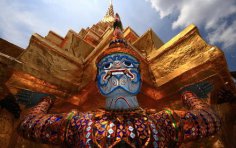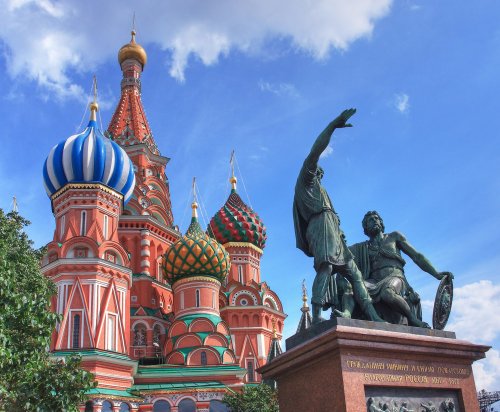
We'll omit city names derived from saints—like Santiago, Saint Petersburg, Saint Louis—or from the names of great people and gods—Washington, Rome, Kyiv, Athens. We'll focus on cities whose names have meanings in their native languages. This might be interesting.
The capital of Hungary is Budapest . The Hungarian city of Buda comes from the verb “budovati,” meaning “to build.” It was located on one bank of the Danube. On the other was the artisan city of Pest, which translates as “oven.” In 1873, they merged into a single settlement—Budapest, which literally means “to build an oven.”
Adler means “eagle.” In Russia, the USA, and Switzerland. And, of course, the Russian regional center of Oryol (as my wife wisely observed).
Amsterdam is the “dam on the Amstel River” in the US and the capital of the Netherlands.
Baghdad . The most common version of the word's origin is from the Old Persian “baga” – god and “dad” – given, i.e., “God-given.” The capital of Iraq.
Belgrade , Belgorod —they're simply a “white city.” The capital of Serbia and the regional center of Russia. Of the colored cities, there are also “blue cities”—two Bluetowns , in the USA and Ireland. The “black city” is Blacktown in the USA. The “yellow city” is Yellowtown in the USA. The “green city” is Zelenograd in Russia, and four Greentowns in the USA. And, of course, there are endless variations of “red” across Russia, right up to the Red Latvian , which makes Latvian citizens shudder when they encounter it on the M10 highway near St. Petersburg.
Berlin , the capital of Germany. Two versions – from the German “bear” or the Polabian “swamp.”
Bern . In 1191, a certain duke was hunting in the forests of what is now Switzerland and decided that the first animal he killed would give the city its name. He caught a bear. Thus, the name of the canton's and Confederation's capital was born: Bern, meaning “bear.”
Brussels – translated from Old Netherland as “swan’s nest,” and from Flemish as “village on the swamp.” The capital of Belgium.
Warsaw . The old Polish spelling of Warsaw—Warszewa or Warszowa—meant “belonging to Varsh.” Etymology attributes the origin of the city's name to the name of a fisherman and his wife, Sawa. There are several other legends. The capital of Poland.
Vilnius —the ancient form of the Lithuanian name of the city (Vilnia) and its Belarusian equivalent (Vilnia)—comes from the name of the Vilnia River, a left tributary of the Viliya River, making it a hydronym like Moscow or Voronezh. The capital of Lithuania.
Damascus – according to one legend, the city's name comes from the Aramaic “demashq,” meaning “brother's blood.” According to the Bible, Cain killed Abel in Damascus on Mount Qasyun. It is the capital of Syria.
Dublin – the name arose from the fusion of two Irish words: dubh – black – and linn – pool. However, the city's modern name in modern Irish is written as Baile Atha Cliath – “settlement by the ford.” It is the capital of Ireland.
Cairo . The Arabs, who arrived on the banks of the Nile, built their capital here in 969, El-Qahira, meaning “the conqueror.” Hence the altered Cairo—the capital of Egypt.
Caracas – there are several versions of the city's name. The first is that the word “caracas” in the local Indian language means “valley of singing birds”; the second is that one of the tree species growing in this area was called “karaka” by the Indians. It is the capital of Venezuela.
Cambridge is a bridge over the River Cam. It's a famous university town in the UK. There are countless towns in English-speaking countries with ” bridge ” in their names. Much like Komsomolsk or Oktyabrsky in Russia.
Copenhagen – meaning “trading port” in Danish. The capital of Denmark.
Endless “new cities” are scattered across the world map: Russian and Ukrainian Novgorods , Bulgarian Novgorod , 10 Nove Mestos in the Czech Republic and Slovakia, 3 Nowe Miastos in Poland, 4 Naples in Italy, 4 Neapolises in Greece, 6 Newtowns in the USA and UK, 7 Neuburgs in Germany. I didn't find any Arabic, Indian, Chinese, African, or Japanese “new cities” (I'm sure they exist too), since I don't speak any alphabets other than Latin and Cyrillic.
Rio de Janeiro , meaning “January River,” is the Portuguese translation of the former capital of Brazil. It was founded by the Portuguese in 1502. There are two theories about the origin of the settlement's name. The first is that sailors thought Guanabara Bay was a river, and since it was the first day and month of the year, they called it “January River.” The second is that Portuguese geographers at the time didn't distinguish between “river” and “bay”—they simply used the word “rio” for everything.
Krungthep Ratana Kosin Mahintara Ayutthaya Mahadilokpop Noparatana Ratchani Burirom Udomratchani Mahasan Amokpiman Sakatuttiya Visanukam – the full name of the capital of Thailand. Krungthep – formerly Bangkok . The longest place name in the world, listed in the Guinness Book of World Records. Translation: “The great city of angels, the highest repository of divine treasures, the great land that cannot be conquered, the great and prosperous kingdom, the magnificent capital of the nine precious stones, the place where the greatest rulers live and the great palace is located, the abode of gods who can transform into spirits.”
These are some funny names and translations.





